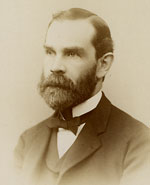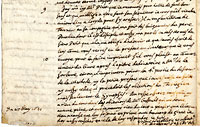Ex-Libri
Recently returned Descartes letter leads all the way back to nineteenth-century Italian book thief Guglielmo Libri. By Jeremy B. Dibbell
This month’s column was inspired by a February New York Times article, “Descartes Letter Found, Therefore It Is.” Punny headline notwithstanding, the piece by Patricia Cohen has at its root one of the most serious book and manuscript thefts of all time. The ironically-named Guglielmo Libri, an Italian polymath, stole thousands of books and manuscripts from libraries across France in the 1840s, and even now, more than 150 years later, the materials are still turning up and making their way home.
The Times piece focuses on a letter by René Descartes dated May 27, 1641, one of 72 Descartes letters stolen by Libri from the Institut de France. Donated by the widow of autograph collector Charles Roberts in 1902, the letter has been in the collections of Haverford College in Haverford, Pennsylvania. cholar Erik-Jan Bos, who is assisting with the publication of a scholarly edition of Descartes’ letters, saw an online reference to the Haverford letter and contacted John F. Anderies, head of special collections at Haverford, who then alerted the college’s president, Stephen Emerson. Emerson then contacted the Institut de France and offered to return the letter. The Institut awarded Haverford a 15,000-euro “prize,” and its chancellor wrote to Emerson that his action “honors you and exemplifies the depth of moral values that you instill in your students.” The Descartes letter will arrive home in June.
Reading the article and learning something of Libri’s actions, it quickly became clear that there was quite a story there. I obtained a copy of the only full-scale biography of the man, The Life and Times of Guglielmo Libri, by P. Alessandra Maccioni Ruju and Marco Mostert (Verloren Publishers, 1995), and delved into his sordid career. Those Descartes letters, it turned out, were just the smallest tip of the iceberg.
Libri, a Tuscan noble, was well educated and skilled in several topics, most notably in studies relating to the history of math and science. His biographers note of Libri: “Precocious in bibliophilia as in everything else, he had begun buying rare editions in Florence at the age of twelve,” had compiled three book catalogs before his eighteenth birthday, and very early on began buying Aldine editions in order to quickly sell them at a profit. Exiled from his homeland for political machinations in the early 1830s, Libri fled to France, where he soon took up residence in Paris and became something of a settled academic expert in his fields of study and their bibliography. Elected to the major learned societies of France, Libri expertly cultivated connections with influential scholars, librarians, and others, and gained appointment as a cataloger for the massive project to compile a catalog of the manuscripts and printed books held by the various provincial libraries around France.
Unfortunately for the libraries, Libri used his influence and power to “augment” his impressive collection of printed books, manuscripts, and autographs. While publicly lamenting the state of French libraries, urging the librarians to take better care of their materials and make them available to the public, Libri was simultaneously taking advantage of the lax security and poor cataloging to make off with rare manuscripts and books (sometimes substituting inferior copies of the books, or “exchanging” treasures for modern items of much lesser value). When he was once confronted with a theft, Libri denied it, but offered to “give” his copy of the book in question to the library as a replacement for its missing one.
Libri didn’t just steal books. He arranged with binders, forgers, and others to change the copies by adding false ownership signatures (including one inscription “Di Dante Alighieri”), altering and obliterating library markings, fabricating receipts and purchase records, &c. Ruju and Mostert found among Libri’s papers “examples of his attempts to write in various calligraphic styles. Some of this may seen innocent enough, but imitations of the signatures of the scientist Francesco Redi and of Bradiamente were clearly practice for deception.” Libri also talked up the idea of the “perfect copy,” and when he didn’t have one, he inserted blank sheets and made his own.










